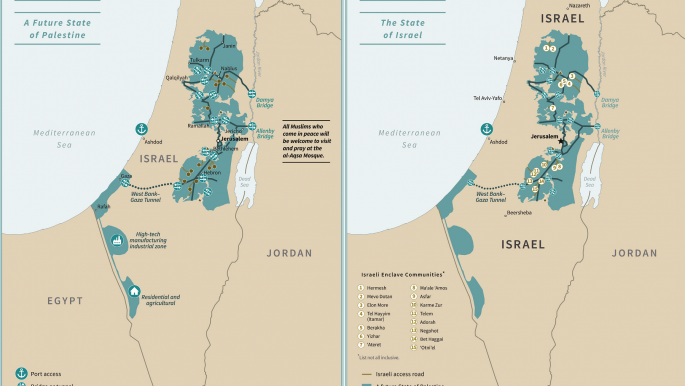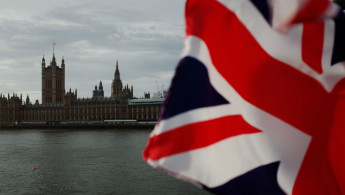UK cautions Israel against annexing West Bank following release of Trump's 'peace plan'
The UK foreign office said London was "concerned" by reports of possible moves toward annexation of parts of the West Bank by Israel.
"Any such unilateral moves would be damaging to renewed efforts to re-start peace negotiations, and contrary to international law," it said in a statement.
"Any changes to the status quo cannot be taken forward without an agreement negotiated by the parties themselves."
Britain has been extremely cautious in response to the long-delayed plan, which shows clear bias towards Israel and was angrily rejected by Palestinians.
Trump unveiled the plan on Wednesday at an event attended by Israeli Prime Minister Benjamin Netanyahu but no Palestinians.
Twitter Post
|
On Thursday, UK Foreign Office minister Andrew Morrison said "we owe America and its president at least the time to consider this plan".
But he also stressed that "this is not our plan" and that Britain was not fully backing it.
"Of course we welcome this plan," Morrison told parliament. "This doesn't mean we endorse its contents."
The so-called 'Deal of the Century' condemns Palestinians to further land grabs, offering Israel free reign to annex large parts of the West Bank and Jordan Valley, as well as guaranteeing the permanence and prosperity of Israel's settlements, considered illegal under international law.
Israeli officials said Netanyahu would seek cabinet approval on Sunday to annex settlements and territory that would become part of Israel under Trump's plan.
But Jared Kushner - Trump's adviser and son-in-law who spearheaded the Middle East initiative - said that Washington does not want any moves made before Israel's March 2 election.
Quest for Arab support
Meanwhile, Palestinian leaders themselves rejected Trump's peace proposal as an unacceptable capitulation to Israel that tramples on the long-standing aspirations of their people.
Palestinian president Mahmoud Abbas vowed the initiative unveiled in Washington on Tuesday would fail.
Read more: The 5 most outrageous proposals in Trump's bizarre 'Deal of the Century'
"This conspiracy deal will not pass. Our people will take it to the dustbin of history," he said after a meeting in the West Bank city of Ramallah of various Palestinian factions including Islamist group Hamas, which pledged to "resist the deal in all its forms".
Trump's proposal included a long list of measures directly in line with Israeli interests, notably recognition of Jerusalem as the "undivided capital" of the Jewish state.
| |
"If Jerusalem is not the capital of the Palestinian state, how will we accept that?" Abbas asked, stressing that it was "impossible for any child, Arab, Muslim or Christian," to do so.
Senior Hamas official Khalil al-Hayya said the Islamist group which controls Gaza would never "accept any substitute for Jerusalem as the capital of the Palestinian state".
"We warn the whole world not to go along with this deal," he said.
The Palestinians have sought to rally international support against the plan, which they see as illegal and a violation of their rights.
"What we're trying to do here is to get international consensus behind us, behind President Mahmoud Abbas and his determination to achieve peace," said Palestinian chief negotiator Saeb Erekat.
But there was a muted response, even within the Arab world.
Both Egypt and the Gulf Arab states held off on any immediate criticism of their US ally, saying they would study the plan's contents.
Those governments have quietly moved closer to Israel in recent years amid shared hostility towards Iran.
Turkish President Recep Tayyip Erdogan on Friday accused some Arab countries of "treason" for backing the US plan, singling out Saudi Arabia, the United Arab Emirates, Bahrain and Oman for criticism.
Abbas will try to rally opposition at an emergency meeting of the Arab League in Cairo on Saturday.
 |
What we're trying to do here is to get international consensus behind us, behind President Mahmoud Abbas and his determination to achieve peace - Saeb Erekat, Palestinian chief negotiator |
 |
Pro-Israeli plan
Conceptual maps included in the long-awaited peace plan, designed to resolve the Israel-Palestine conflict, expose Israel’s mass annexation of Palestinian land while giving the Palestinians limited sovereignty over an alleged "future Palestinian state".
 |
| [Click to enlarge] |
Meanwhile, Israel is due to remain in control of a unified Jerusalem as its capital, contrary to the demands of the Palestinians.
Trump’s plan also spares Israel’s controversial and illegal settlements in the occupied West Bank, which will remain in place. Around 200,000 Israeli Jews now live in east Jerusalem in settlement homes considered illegal under international law.
The Palestinians have already rejected the proposal, accusing Trump of being biased in favour of Israel as he has adopted policies that bolster Israel at their expense.
Trump, releasing the plan before a strongly pro-Israel audience at the White House with Israeli Prime Minister Benjamin Netanyahu by his side, acknowledged that he has done a lot for Israel, but he said he wanted the deal to be a “great deal for the Palestinians.” Trump said the deal is a "historic opportunity" for Palestinians to achieve an independent state of their own.
The 50-page political outline goes further in concessions to the Palestinians than many analysts had believed was likely. However, it would require them to accept conditions they have been previously unwilling to consider, such as accepting West Bank settlements. It builds on a 30-page economic plan for the West Bank and Gaza that was unveiled last June and which the Palestinians have also rejected,
Under the terms of the “peace vision" that Trump's son-in-law and senior adviser Jared Kushner has been working on for nearly three years, the future Palestinian state would consist of the West Bank and Gaza, connected by a combination of above-ground roads and tunnels.
Netanyahu and his main political challenger in March elections, Benny Gantz, had signed off on the plan.





 Follow the Middle East's top stories in English at The New Arab on Google News
Follow the Middle East's top stories in English at The New Arab on Google News

![Israeli forces ordered bombed Gaza's Jabalia, ordering residents to leave [Getty]](/sites/default/files/styles/image_330x185/public/2176418030.jpeg?h=a5f2f23a&itok=_YGZaP1z)
